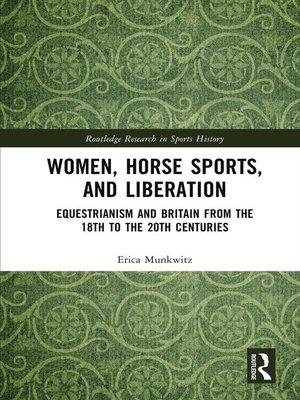Women, Horse Sports and Liberation
ebook ∣ Equestrianism and Britain from the 18th to the 20th Centuries · Routledge Research in Sports History
By Erica Munkwitz

Sign up to save your library
With an OverDrive account, you can save your favorite libraries for at-a-glance information about availability. Find out more about OverDrive accounts.
Find this title in Libby, the library reading app by OverDrive.



Search for a digital library with this title
Title found at these libraries:
| Library Name | Distance |
|---|---|
| Loading... |
*Shortlisted for the 2022 Lord Aberdare Literary Prize*
This book is the first, full-length scholarly examination of British women's involvement in equestrianism from the eighteenth through the twentieth centuries, as well as the corresponding transformations of gender, class, sport, and national identity in Britain and its Empire.
It argues that women's participation in horse sports transcended limitations of class and gender in Britain and highlights the democratic ethos that allowed anyone skilled enough to ride and hunt – from chimney-sweep to courtesan. Furthermore, women's involvement in equestrianism reshaped ideals of race and reinforced imperial ideology at the zenith of the British Empire. Here, British women abandoned the sidesaddle – which they had been riding in for almost half a millennium – to ride astride like men, thus gaining complete equality on horseback. Yet female equestrians did not seek further emancipation in the form of political rights. This paradox – of achieving equality through sport but not through politics – shows how liberating sport was for women into the twentieth century. It brings into question what "emancipation" meant in practice to women in Britain from the eighteenth through twentieth centuries.
This is fascinating reading for scholars of sports history, women's history, British history, and imperial history, as well as those interested in the broader social, gendered, and political histories of the nineteenth and twentieth centuries, and for all equestrian enthusiasts.







